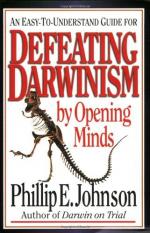|
This section contains 10,257 words (approx. 35 pages at 300 words per page) |

|
The term Darwinism has both a narrow and a broad meaning. In the narrow sense, it refers to a theory of organic evolution presented by Charles Darwin (1809–1882) and by other scientists who developed various aspects of his views; in the broad sense, it refers to a complex of scientific, social, theological, and philosophical thought that was historically stimulated and supported by Darwin's theory of evolution. Biological Darwinism—the first sense—was the outstanding scientific achievement of the nineteenth century and is now the foundation of large regions of biological theory. Darwinism in the second sense was the major philosophical problem of the later nineteenth century. Today, Darwinism no longer provides the focus of philosophical investigation, largely because so much of it forms an unquestioned background to contemporary thought.
Darwin's theory is an example of scientific innovation that has had reverberations into the farthest reaches of human thought. It...
|
This section contains 10,257 words (approx. 35 pages at 300 words per page) |

|


